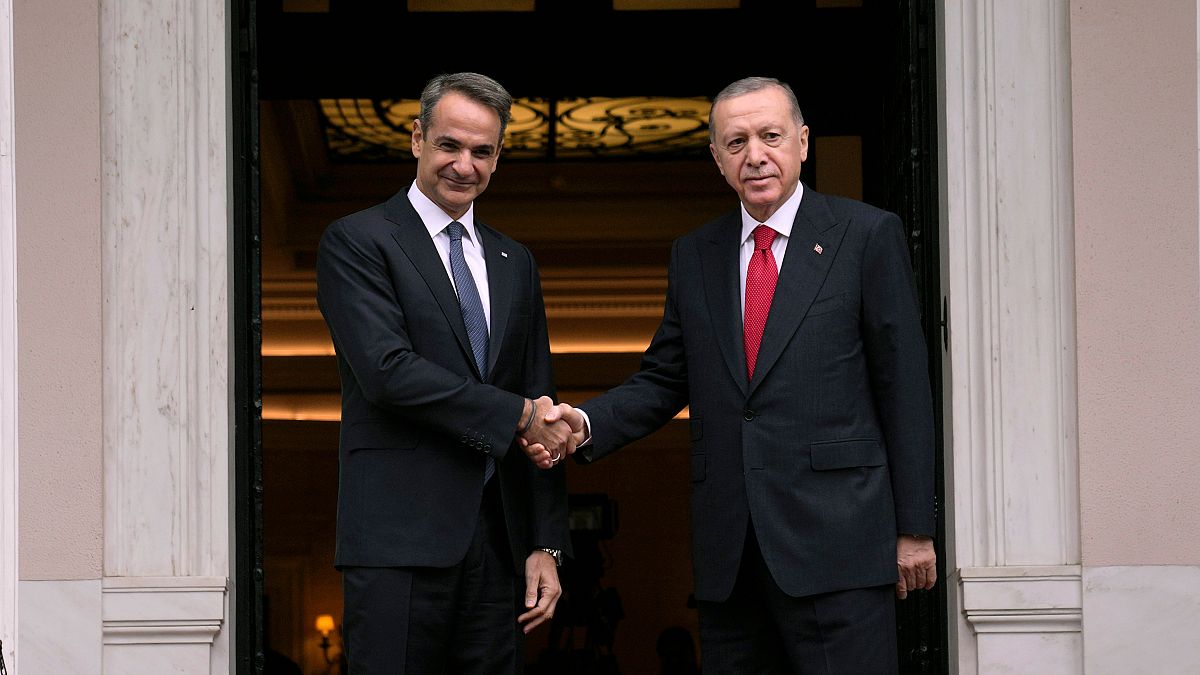‘Focusing on the positive agenda’: Greek and Turkish leaders meet
Turkish President Recep Tayyip Erdogan and Greek Prime Minister Kyriakos Mitsotakis met in Ankara on Monday for high-level talks aimed at boosting relations between the competitive Aegean neighbours.
The leaders of Greece and Türkiye met on Monday for talks aimed at underlining their efforts to put aside decades-old disputes, but they also revealed deep divisions over the Israel-Hamas war.
Speaking at a news conference in Ankara following the two-hour face-to-face summit, Turkish President Recep Tayyip Erdogan jumped on comments by Greek Prime Minister Kyriakos Mitsotakis in which he described Hamas as a terrorist organisation.
“I do not see Hamas as a terror group,” Erdogan said.
“I see it as a group of people trying to protect their own land.” He said that Türkiye was currently treating “more than 1,000 Hamas members” in its hospitals.
Greece, like most Western states, considers Hamas a terrorist organisation but Erdogan repeated his reference to the group as a “resistance organisation.”
Trade, energy, education and cultural ties on the agenda
The leaders were meeting for the fourth time in the past year in a bid to strengthen a normalisation process.
Türkiye and Greece, which are NATO members, have been at odds for decades over a series of issues, including territorial claims in the Aegean Sea and drilling rights in the Mediterranean, and have come to the brink of war three times in the last half-century. A dispute over energy exploration rights in 2020 led to the two countries’ warships facing off in the Mediterranean.
They agreed last December to put their disputes aside and focus on areas where they can find consensus. The list of items on the so-called positive agenda includes trade, energy, education and cultural ties.
Since that summit in Athens, the regional rivals have maintained regular high-level contacts to promote fence-mending initiatives, such as allowing Turkish citizens to visit 10 Greek islands without cumbersome visa procedures.
Stressing the ties between the two countries, Mitsotakis said the deal allowed Turks and Greeks to “get to know each other, which is an important step”.
Similarly, Erdogan referred to the Turkish-Muslim minority in Greece’s Thrace region as a “friendship bridge between the two communities.”
Earlier, he described the normalisation process as beneficial to both countries and the region.
“The channels of dialogue are being kept open and we are focusing on the positive agenda,” Erdogan said.
The propensity for quarrels remains, however. The recent opening of a former Greek Orthodox church in Istanbul for use as a mosque led to Greece accusing Türkiye of “insulting the character” of a World Heritage Site.
Türkiye, meanwhile, criticised a Greek plan unveiled last month for “marine parks” in parts of the Ionian and Aegean Seas. Ankara said the one-sided declaration was “a step that sabotages the normalization process.”
But such low-level disputes are far removed from relations a few years ago, when energy exploration in the eastern Mediterranean resulted in a naval confrontation and a vow by Erdogan to halt talks with Mitsotakis’ government.
Despite sharp differences over the Israel-Hamas war, Erdogan and Mitsotakis are keen to hold back further instability in the Mediterranean as Russia’s full-scale invasion of Ukraine grinds on.
The recent thaw in relations was partly helped by Greek solidarity after last year’s devastating earthquake in southern Turkey. Erdogan has initiated a broader effort to reengage with Western countries following an election victory last year that saw him extend his two-decade rule by a further five years.


![Türkiye: UNFPA – Menstrual Hygiene Management among Refugee Women and Girls in Türkiye – September 2022 [EN/TR] – Türkiye Türkiye: UNFPA – Menstrual Hygiene Management among Refugee Women and Girls in Türkiye – September 2022 [EN/TR] – Türkiye](https://reliefweb.int/sites/default/files/styles/large/public/previews/c5/b0/c5b0b9d8-5a9b-48dd-a480-3880aa9fdd3b.png)
